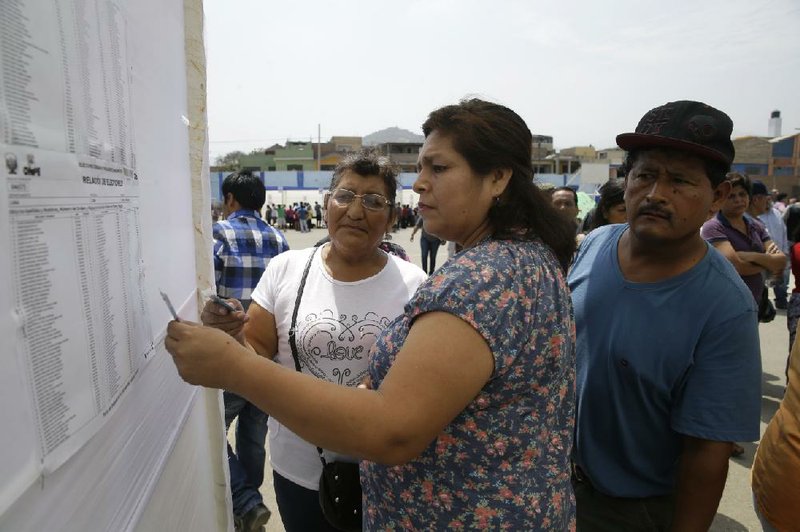LIMA, Peru -- The daughter of jailed former President Alberto Fujimori looked headed to victory in the first round of Peru's presidential election Sunday and will likely face a former World Bank economist in a June runoff, preliminary results indicated.
With 20 percent of the ballots counted late Sunday, Fujimori had 38 percent of the vote. Investor-favorite Pedro Kuczynski had just under 26 percent, while leftist congressman Veronika Mendoza, who had made a late surge in pre-election polls, was running third with 16 percent.
Full results were expected by today, but supporters of the 77-year-old Kuczynski celebrated in the streets outside his campaign headquarters after two unofficial quick counts indicated he would edge out Mendoza for the right to face off with Fujimori on June 5. Such counts have been reliable predictors of results in previous Peruvian elections.
The center-right Fujimori led opinion polls for months but faces a competitive runoff scenario because of how polarizing a figure she is among Peruvians, who either adore her father for defeating Maoist-inspired Shining Path rebels and taming hyperinflation or loathe him for human-rights abuses and ordering tanks to shut down Congress.
In a bid to project a more moderate image, Fujimori promised during her campaign not to pardon her father if elected. On Sunday night, she told supporters that it was time to bury the past.
"The new political map being drawn clearly shows Peruvians want reconciliation and don't want to fight anymore," she said.
Maritza Sacsara, one of the many rural voters who cast votes for Fujimori, called her "a born leader" and credited the candidate with campaigning fiercely in small towns and villages often ignored by Peruvian politicians.
In the campaign's final weeks, Fujimori's opponents took to city streets by the thousands to warn against what they said would be a return of authoritarian rule if Fujimori became president.
Adding bitterness to the race, two candidates, including Fujimori's strongest rival, were barred from the contest by Peru's electoral tribunal for campaign violations or technicalities, decisions questioned by the Organization of American States.
If Kuczynski holds on to the No. 2 spot, it will ensure Peru continues along a free-market path after Mendoza's rise in the polls spooked investors.
In a Lima shantytown, bookstore owner Francisco Huaman said he voted for Mendoza in the hope she would support small businesses, tackle corruption and defend the environment.
"Mendoza is the one who offers real change," he said.
Mendoza vowed to radically change the pro-business economic model that propelled record growth over the past decade by ramping up spending and reducing Peru's dependence on extraction of natural resources that she says degrades the environment. Peru is among the world's top three silver producers.
After finishing a strong third in the 2011 election, Kuczynski threw his support behind Keiko Fujimori in that year's runoff. He later said he regretted that decision but considered it necessary in trying to prevent the election of leftist Ollanta Humala, who despite having ties to socialist Venezuela and leading an army rebellion in his youth kept up a pro-business policy framework as president. The constitution barred him from seeking a second, consecutive term.
Kuczynski is now urging Peruvians to turn the page on the widespread corruption and human-rights violations associated with the Alberto Fujimori years.
But with an elite pedigree he may face a hard time connecting with Peruvians, especially in rural areas where support for Keiko Fujimori is strongest.
Her Popular Force party secured an estimated 60 seats in the 130-member congress, while five other parties split the remaining seats.
Almost half of Peruvians had said they would never vote for anyone associated with Alberto Fujimori, who governed from 1990 to 2000 and is serving a 25-year sentence for authorizing death squads and corruption.
Although Alberto Fujimori is credited with beating back the guerrillas, a few remain. On Saturday, suspected Shining Path rebels killed three soldiers and a driver on their way to a polling place in a mountain town, according to army officials.
Sunday's elections provided notable defeats for traditional politicians. Two former presidents, Alejandro Toledo and Alan Garcia, finished near the bottom of the 10-candidate field, while the congressional slate for Garcia's almost century-old APRA party barely got by the minimum 5 percent threshold to hold onto its legal standing.
Information for this article was contributed by Rodrigo Abd and Joshua Goodman of The Associated Press.
A Section on 04/11/2016

